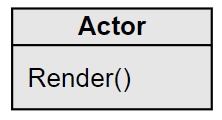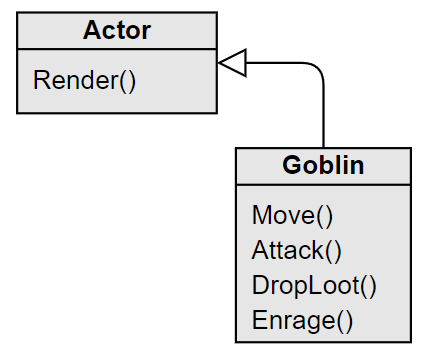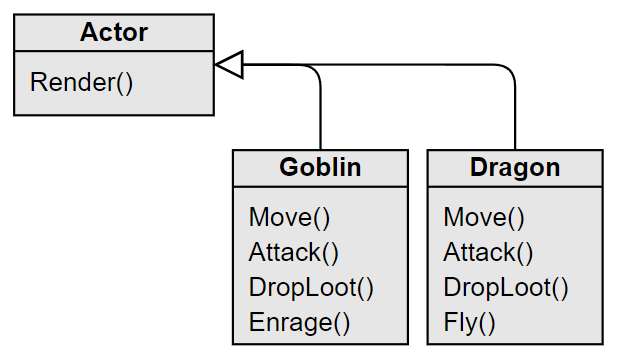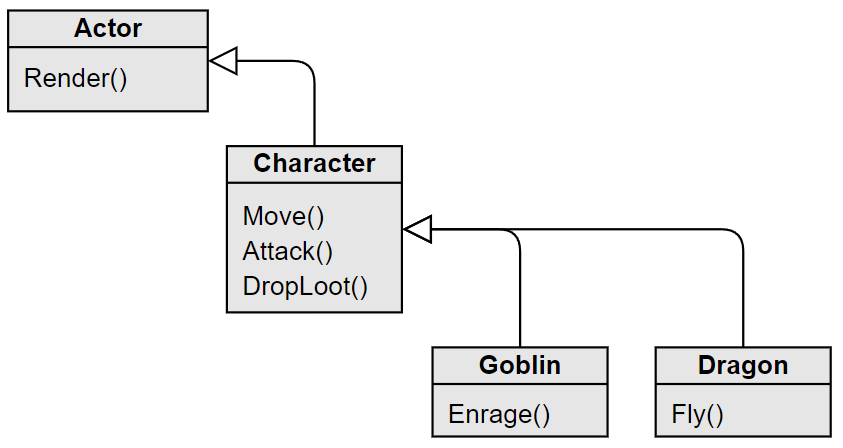Inheritance
In this lesson, we explore C++ inheritance, guiding you through creating and managing class hierarchies to streamline your code
In the previous chapter, we saw how we could create user-defined types, helping us design our code in a way that makes sense for the specific project we're working on.
For example, were we making a game where players can fight goblin enemies, we could have a Goblin class, containing all our goblin-specific code:
class Goblin {
public:
void Render(){}
void Move(){}
void Attack(){}
void DropLoot(){}
void Enrage(){}
};When we start implementing more complex systems using classes, we quickly encounter a problem.
Why we need Inheritance
Our game will probably need some simple objects we can scatter around the environment, like rocks.
Rocks aren't as complicated as goblins. They don't need to Attack() or DropLoot() - they just need to Render() themselves to the screen:
class Rock {
public:
void Render(){}
};We have a bit of a problem here - both of our classes have a Render() method. In fact, given we're making a game, a lot of our types are going to need this method.
With what we've learned so far, there are no good ways to deal with this. Some options might be:
Option 1: Let Both Classes have a Render() Function
Having the same code in multiple places is a pain - it makes our projects very complicated. Given we're making a game, a lot of our types are going to need this function, so the problem gets worse and worse as we add more types.
Option 2: Repurpose the Goblin Class
Another option would be to make the Goblin class more general - we could call it something like GameObject and it could contain all the functionality any object might need.
This reduces the need to duplicate code, but it creates extremely complicated classes. It also degrades performance - class functions like Attack() need class variables like int Damage to support those actions. Having every rock in our game carry those variables, which they never need, is a waste of resources.
To solve this problem, what we need is the ability to define multiple layers of abstraction, and that is what inheritance gives us.
Designing with Inheritance
Inheritance allows us to organize our classes into hierarchies. This allows a class to inherit the functions and variables of its parent.
For example, let's imagine a class that simply grants the object the ability to exist in our world, and render itself to the screen. We'll call this the Actor class.

Next, let's create a class for our Goblins. Goblins also need the ability to be rendered, but with inheritance, we no longer need to recreate that functionality. Actor already has that ability.
Goblins are just a more specific type of Actor, so we can have our Goblin class inherit all the abilities of the Actor class.

Now, our Goblin class has the Render() ability, without needing to write any additional code. It just inherits it from the parent Actor class.
This tree structure provides our classes with a powerful ability. We get to have our dedicated, specific classes, but they don't need to duplicate the more generic, shared functions.
They can instead just inherit those functions and variables from their ancestors.
Test your Knowledge
Inheritance
What is inheritance?
Implementing Inheritance
Let's create our Actor class, and our Goblin class that inherits from Actor. To do this, we add some additional syntax to our class Goblin definition:
class Actor {
public:
void Render(){};
};
class Goblin : public Actor {
public:
void Move(){}
void Attack(){}
void DropLoot(){}
void Enrage(){}
};Now, when we create an object from the Goblin class, that object will be both a Goblin and an Actor, able to use the functions of both:
Goblin Bonker;
// Available because Bonker is a Goblin
Bonker.Attack();
// Available because Bonker is an Actor
Bonker.Render();With this class hierarchy, all Goblin objects are inherently also Actor objects. The opposite is not necessarily true - an Actor is not necessarily a Goblin.
It could just be a plain Actor, or it could be some other subclass of Actor.
Actor Rock;
// Available because Rock is an Actor
Rock.Render();
// But we can't do this, because Rock is not a Goblin
Rock.Attack();Test your Knowledge
Inheritance Relationships
Consider the following code:
class Item {};
class Weapon : public Item {};
int main(){
Weapon IronSword;
}What is IronSword?
Consider the following code:
class Item {};
class Weapon : public Item {};
int main(){
Item WoodenBarrel;
}What is WoodenBarrel?
Multiple Layers of Inheritance
Let's add a new type of object to our game - we need dragons, so let's define a type, using the same approach:

Something should seem off here. The Dragon and Goblin classes both have the Move(), Attack(), and DropLoot() functions. That's too much duplicate code.
Thankfully, with our new knowledge of inheritance, we might realize a way we can improve this design.
We can move that shared code into a new class. We can then have both Goblin and Dragon inherit from it. Let's call this new class Character

Now, we have multiple layers of inheritance. With this setup, any Goblin or Dragon we create will be a member of 3 classes, inheriting the abilities of all of them:
class Actor {
public:
void Render(){}
};
class Character : public Actor {
public:
void Move(){}
void Attack(){}
void DropLoot(){}
};
class Goblin : public Character {
public:
void Enrage(){}
};
class Dragon : public Character {
public:
void Fly(){}
};
int main(){
Dragon Dave;
// Dave is an Actor
Dave.Render();
// And a Character
Dave.Attack();
// And a Dragon
Dave.Fly();
}Preventing Inheritance with final
Sometimes, we create a class that is not designed to ever have a child class. To clarify that intent, and have the compiler enforce it, we can add the final specifier to the class heading:
class Demon final {};
// Combining final with a base class
class Vampire final : public Character {};Should anyone try to inherit from a final class, the compiler will block them:
class Warrior : public Vampire {}Cannot inherit from 'Vampire' as it has been declared as 'final'Summary
In this lesson, we explored the concept of inheritance in C++. We explored how inheritance allows us to create hierarchies of classes, enabling child classes to inherit properties and behaviors from their parent classes.
This not only helps in organizing code into a more understandable structure but also aids in reducing redundancy. We:
- Learned the basics of inheritance and how it helps in organizing classes into hierarchies.
- Explored public and private inheritance, understanding how access levels affect the inherited members.
- Demonstrated the implementation of inheritance in C++ with practical examples, such as
GoblinandActorclasses. - Discussed the use of the
finalkeyword to prevent further inheritance from a class. - Examined multiple layers of inheritance through examples, showcasing how classes can inherit from other derived classes.
Protected Class Members
Learn about protected class members in C++, including how and when to use them in your code, especially in the context of inheritance and class design